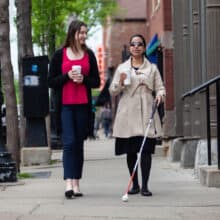Commentary: It’s What We Can Do That Counts
October is National Disability Employment Awareness Month. I have always thought that the biggest challenge that prevents those of us with disabilities from succeeding is the attitude society often has about our capabilities. Naturally, this leads to what I perceive as the biggest obstacle that prevents people with disabilities from obtaining and retaining employment. Data released from the U.S. department of Labor indicates that last September, the percentage of disabled individuals who are unemployed rose from 10.2 percent to 10.4 percent. In blind and visually impaired individuals, the unemployment rate is around 70 percent. This rate has mostly remained the same before and after the passage of the ADA 25 years ago.
If the law permits us to request accommodations like Braille signs on elevators and adaptive technology to be independent and carry out our work, then why is this rate so high? It all comes down to the persisting negative attitudes about people with disabilities. On one hand, I can’t blame employers. After all, those of us who have disabilities are a minority, so most people have never encountered, let alone interacted with one of us. On the other hand, however, it is incredibly frustrating that most employers and the general public don’t always look past our disabilities. Although disabled employees looking for jobs meet all of the qualifications, employers automatically assume the person is incapable.
Thanks to technology, I and my fellow blind peers can do just about everything sighted employees do. We can type documents and reports, do research on the Internet and send and receive emails from our colleagues like everyone else. That is just one of the numerous ways in which technology has allowed us to become more employable. The problem is that because most people are unaware that such products exist, they automatically assume that we can’t possibly use a computer, and therefore cannot work.
Don’t get me wrong, there are those employers who have either heard or are willing to learn about assistive technology and other accommodations that can help blind and visually impaired people succeed in the job. Unfortunately, this is a very small group. Most people have unrealistic fears about hiring the blind and disabled. Employers might be skeptical about hiring us because they are afraid we will get injured or will need someone’s help even to find the bathroom. This is simply not true, as those of us who are looking for employment already know techniques that will help us do these and many other things independently and safely.
The truth is that blind and visually impaired people can do just about any job you can think of. There are blind teachers, lawyers, masseurs, therapists, psychologists, musicians, technicians, actors, journalists, radio and TV broadcasters, politicians, call center agents, executive directors and accountants, just to name a few. Like anyone, blind and visually impaired people have different talents and ambitions. If we’re out there looking for a job, it’s because we know we meet the qualifications and are confident we will be able to carry out the task.
Remember, we have learned how to be independent and productive. If we’re unsure of how we will do a particular task, chances are that by working together we will come up with new and creative solutions. I dream of the day when more blind and visually impaired individuals join the workforce, but most importantly, I want to see the day when employers will look past our disability. After all, our talents and abilities are what really count on the job.





